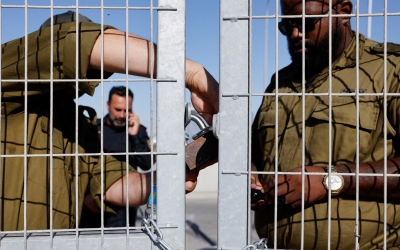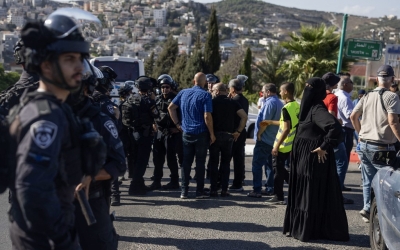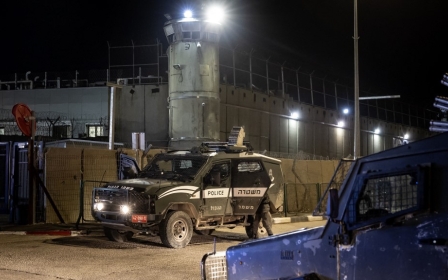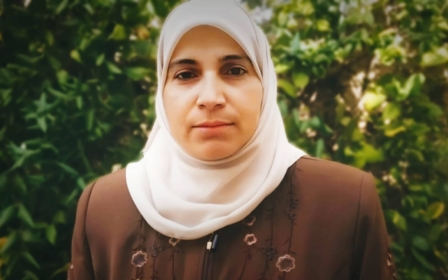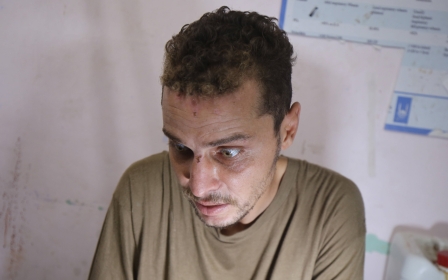Palestinian women prisoners starved and strip searched as Israeli abuse intensifies

Israeli prison authorities have intensified abuses against Palestinian women prisoners in recent months, detainees’ relatives and a monitoring group have said.
According to the Palestinian Detainees and Ex-Detainees Affairs Commission, women prisoners have been subjected to regular strip searches, arbitrary room inspections and confiscation of clothes and other essential items.
At least 94 female prisoners in the Damon Prison are "suffering" in worsening conditions that are “beyond all imaginable limits”, the commission said in a statement last week.
"Hundreds of testimonies from prisoners reveal shocking and horrific accounts of what has occurred and is ongoing against both male and female prisoners,” said the commission, basing its statement on recent visits made by lawyers to the prisoners.
“This includes the testimonies of female prisoners from Gaza, who have faced violations and crimes more severe and cruel than ever since the war began.”
New MEE newsletter: Jerusalem Dispatch
Sign up to get the latest insights and analysis on Israel-Palestine, alongside Turkey Unpacked and other MEE newsletters
The retaliatory measures taken by the Israeli authorities include the confiscation of additional hijabs, shoes and other clothing items.
Hadeel Hassanein, the sister of imprisoned journalist Rula Hassanein, said her unwell sister was suffering complications due to the denial of medical treatment in prison.
"She suffers from severe headaches and persistent high blood pressure,” Hadeel told Middle East Eye.
“Recently, she underwent tests at the prison clinic, but no treatment was provided, despite the results indicating blood in her urethra, which could lead to kidney failure if treatment is not provided.”
Rula was arrested from her home in Bethlehem in the occupied West Bank on 19 March, Hadeel said.
Her recently born infant child is also experiencing multiple health issues, primarily because of being unable to breastfeed. The child was born prematurely at seven months and requires special care.
"The baby’s respiratory system has been particularly affected, compounded by the cold weather and low immunity," Hadeel added.
The Israeli Ofer Prison military court has issued two orders for her release that were rejected by the Israeli Military Prosecution, according to Hadeel.
Tala Nasser, a lawyer at the Ramallah-based NGO Addameer, which defends the rights of Palestine prisoners, said medical negligence and overcrowding have been rampant.
"Female prisoners are given very little time outdoors, mainly for showering, as the showers are outside the cells,” Nasser told MEE.
“Additionally, the Israeli prison administration deliberately withholds cleaning supplies in Damon Prison, which has led to an increase in skin infections due to overcrowding. Most prisoners are forced to sleep on the floor.”
‘State without morals’
Among the most prominent violations faced by female prisoners is strip searches.
Under the guise of security procedures, female prisoners are forced to remove all clothing, including underwear, while also enduring verbal abuse and ill-treatment.
The family of Zahra Khodroj, 53, from Qalqilya, remains deeply concerned about her welfare amid the ongoing violations against female detainees.
'I can’t bear to think of my daughter going to sleep hungry, while we have access to all kinds of food'
- Hatem Foqaha, father of detained Palestinian woman
Her husband, Abdul Latif Abu Safaqa, told MEE she was arrested at home on 28 January and remains in detention, awaiting a court hearing.
"When we hear what happens in prisons, we are very worried. The strip searches are humiliating and degrading to our women, and no action is taken to stop this horrific abuse,” Abu Safaqa said.
“We don’t even know if she has been subjected to this treatment," he added.
Khodroj, a mother of seven, ran a centre for prisoner studies in Qalqilya to assist the families of detainees.
She holds a doctorate in human development, a higher diploma in nursing and a master’s degree in environmental sciences. She has also authored 14 books on various subjects.
“It is tragic that a woman with such experience is still behind bars without charge,” her husband said. "These actions reflect a state without morals."
‘We go to bed hungry’
Another common practice of Israeli prisoner authorities is depriving detainees of sufficient food.
According to numerous testimonies, the daily food rations provided by the Israeli prison administration barely constitute half of a normal meal.
Bara’a Foqaha described widespread deprivation that female detainees are subjected to in her lawyer’s last visit to her, her father Hatem Foqaha said.
"We go to bed hungry," was the most distressing statement in her letter, he said.
"I can’t bear to think of my daughter going to sleep hungry, while we have access to all kinds of food," Foqaha told MEE.
Bara’a, a medical student at Al-Quds University, was arrested at a military checkpoint near Nablus on 14 August while returning to her home in Tulkarm from university.
She was placed in administrative detention - without charge or trial - for six months, which can be extended arbitrarily and indefinitely.
A year before her arrest, she had been banned from entering the university for several months due to her participation in student activism.
"One of the things that bothers the female prisoners most, according to her lawyer, is the continuous and violent raids and searches, which occur nearly every week,” Foqaha said.
“Some prisoners have even been punished for trivial reasons, including solitary confinement without justification.”
Middle East Eye delivers independent and unrivalled coverage and analysis of the Middle East, North Africa and beyond. To learn more about republishing this content and the associated fees, please fill out this form. More about MEE can be found here.


